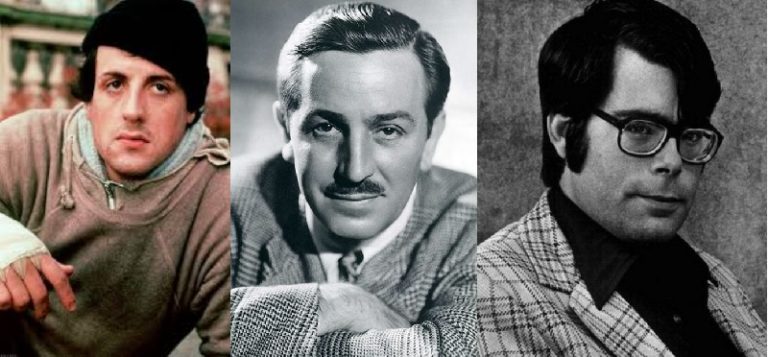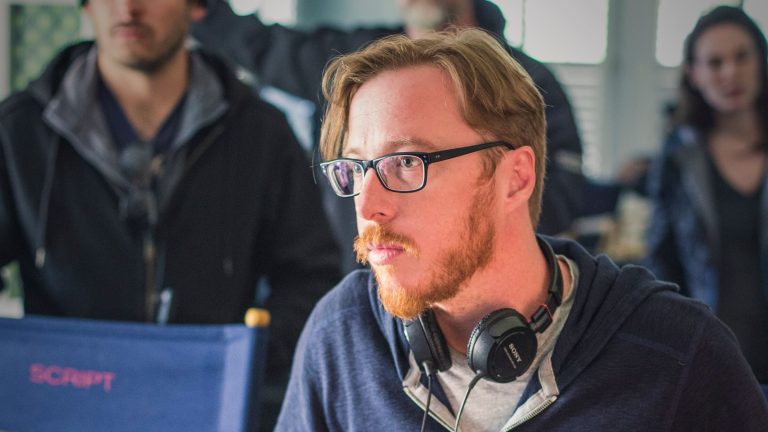16 Tales of Overcoming Constant Failure for Screenwriters

You've written multiple screenplays and put your hope and faith into each and every one of them upon writing that final FADE OUT on the last page. You've been excited — elated — to share them with the world. You did your networking, your marketing, and managed to get them into the hands of managers, agents, development executives, or producers. You waited and waited for them to reply with resounding enthusiasm — and maybe even an offer to represent, option, develop, or purchase your screenplay.
And then you're met with rejection or silence. You're crushed each and every time with each and every script. Despite continued effort after effort, it's just not happening.
This is a story that is all too familiar with screenwriters. It's heartbreaking. We live through the highest of peaks, only to suffer the lowest and darkest of valleys.
The constant rejection stings worse each and every time. Hopes and dreams soon lay in a seemingly dormant state as you contemplate your options, or lack thereof.
It's all part of the journey. And what writers need most is that injection of renewed hope to keep them going. Many fall victim to the constant failure and rejection and can't return, instead choosing another path that perhaps they were always destined for. But others — the few — keep on pushing. They survive long enough to finally see their dream come true.
Writers need to know that they're not alone in their sorrow. They need to know that while at times it may feel like the world is against them and their vision, all who have succeeded went through the same struggles we all have and continue to go through. They suffered through years, and sometimes decades, of rejection and failure before that one single big break where the stars aligned, where they were in the right place at the right time with the right person, and where lightning was captured in a bottle.
Here we share sixteen inspiring tales of failure that eventually lead to success, in an attempt to give any and all writers the piece of mind that they deserve — that it's possible. That this dream is possible despite all of the rejection and heartbreak they've experienced.
1. Stephen King
“By the time I was 14... the nail in my wall would no longer support the weight of the rejection slips impaled upon it. I replaced the nail with a spike and kept on writing,” King stated in his book On Writing. He received 60 rejections before he sold his first short story — The Glass Floor — for just $35. For years he was broke and working multiple jobs — as was his wife — to support his dream. Stephen King grew so frustrated over his attempt to write his first novel Carrie that he threw away the entire early draft. His wife Tabitha found the manuscript in the trash and took it out and read it, insisting that he send it out to publishers. Carrie was rejected multiple times before being picked up for just a 13,000 copy order. But then another publisher finally swooped in and King saw the paperback rights sell for $400,000 — $200,000 of which went to him. That is the equivalent of $856,668.65 in today's money.
2. Colonel Sanders
Sanders hopped from job to job for decades, until he finally started to cook his own chicken in a small Shell Service Station in 1930 during the Great Depression — when he was already 40 years old. Even then, he barely managed to get by as he perfected his "secret recipe" for another decade. He later lost his growing business and was forced to retire. He was broke. He was receiving just $105 from his pension check, wondering how he was going to survive. He then had the idea to find franchises that would cook his recipe. He had the goal to make a nickel off of every piece of his chicken sold. He was rejected a thousand times before he found his partner that would lead to what we know now as the franchise Kentucky Fried Chicken.
3. Theodor Seuss Giesel
Known to the world now as the late Dr. Seuss, this iconic writer struggled for years to even get his material read. His first children's book was rejected by 27 different publishers before someone finally took a chance on him.
4. J.K. Rowling
Before she created what would go on to be the multi-billion dollar literary, movie, and merchandise franchise of Harry Potter, Rowling was broke, severely depressed, divorced, and was a single mother attending school and trying to write a novel. Rowling went from living off of welfare to being one of the richest women in the world in a span of only five years.
5. Walt Disney
Disney had a difficult life before he went on to create not only an iconic cast of animated characters and movies, but one of the most successful and celebrated entertainment companies in the world. He dropped out of school at a very young age and failed to join the Army as he had attempted. Multiple jobs and careers came and went. One of his earlier ventures, Laugh-o-Gram Studios, went bankrupt due to his lack of ability to run a successful business. He was also once fired from a newspaper for “not being creative enough.”
6. Sylvester Stallone
Stallone is an iconic figure of pop culture and Hollywood. He still reigns as one of the biggest movie stars to ever grace the silver screen. But it took him a long time to get there. When he moved to New York to pursue acting, people within the industry scoffed at the thought that this funny looking actor with an equally funny sounding voice would be able to make it as an actor. He had been rejected 1,500 times by talent scouts, agents, etc. He was broke and later homeless. He lived and slept in the New Jersey Port Authority bus terminal for three weeks while trying to scrimp and save money together for another apartment. And then he wrote a script called Rocky.
7. John Grisham
Grisham was initially a lawyer — who had a passion for writing. Despite what could have been a successful career in law, he had a dream that he couldn't deny. But it was never easy. His first novel, A Time to Kill, took him three years to write and he was later rejected by 27 different publishers before it was finally published. His books eventually sold 250 million copies — and counting.
8. Stephanie Meyer
Meyer had no experience as a writer of any kind and had never even written a short story before Twilight. She had considered going to law school because she felt she had no chance of becoming a writer. She wrote to fifteen literary agencies, hoping to get representation. Five did not respond and the other nine rejected her book. It wasn't until one decided to take a chance on her that she finally saw her wildest dreams come true. Her Twilight books were a phenom and the movies adapted from her novels went on to become one of the most successful film franchises of all time.
9. Nicholas Sparks
Twenty-four literary agencies rejected The Notebook. The twenty fifth agent sold it to a publisher for $1 million.
10. Quentin Tarantino
QT was working at a video store (remember those?) while he was writing now famous screenplays like True Romance and Natural Born Killers. For three years — whenever he had the money — he would shoot footage for an early film. However, he was so poor that he could barely ever process the film he shot. And when it was processed, a fire destroyed more than half of the footage. While many call him an overnight success with the likes of his feature directorial debut, Reservoir Dogs, which he also wrote, the truth is he struggled for almost a decade before success started to come his way.
11. Aaron Sorkin
Sorkin spent more than a decade as a struggling actor living in Manhattan and touring the south with a small theater company. He worked odd jobs like delivering singing telegrams, driving a limousine, handing out fliers promoting a hunting-and-fishing show, and bartending at Broadway’s Palace Theatre. During this time, he had no writing aspirations at all, partly due to the fact that he felt that he was the “dumbest person in the room.” It wasn't until he touched up a friend's screenplay dialogue where he finally felt the epiphany of wanting to become a writer.
12. Creighton Rothenberger and Katrin Benedikt
The married writing duo initially had a nice suburban life with a great East coast house and two comfortable corporate jobs — yet both loved movies and had always wanted to write. Creighton decided to finally take on screenwriting and began to write at 4 a.m. before going into his corporate job each morning. He would work a full day and then watch movies and read scripts late into the night. This went on for a number of years until he won the Nicholl Fellowship.
He attained an agent and then he and his wife conceived the script Olympus Has Fallen. But it didn’t sell. After selling their house and moving to Los Angeles to pursue this dream fully, they spent a decade writing multiple spec scripts with no success until they finally sold Olympus Has Fallen. The two have since enjoyed success with multiple studio deals, and major produced credits including The Expendables 3 and London Has Fallen.
13. Franz Kafka
Kafka never saw his principal works published. He struggled for years with nothing but rejection. Only a few of his short stories appeared in literary periodicals. He even later asked his friend Max Brod to burn all his manuscripts after his death. Those manuscripts were the world-famous America, The Trial, and The Castle.
The literary world finally accepted him after his death.
14. F. Scott Fitzgerald
Fitzgerald pursued his dream of writing for years upon years, with no success. He was working in New York as an advertising agent, hoping to make a career as a writer, but every publisher rejected his work. His fiance Zelda even broke off the engagement because she thought he couldnt' support a family. Fitzgerald returned to his parents and revised his novel This Side of Paradise, which was finally published. He would obviously go on to write The Great Gatsby.
15. Michael Schiffer
Schiffer first attempted — and failed — to be both a playwright and novelist. Fed up with the years of rejection, he moved to Los Angeles at the ripe "old" age of thirty-five to become a screenwriter. He gave himself five years and worked really hard, writing fourteen spec scripts until he finally sold Colors. He would then go on to write Crimson Tide, Lean On Me, The Peacemaker, and many others.
16. Andrew Kevin Walker
Walker approached Hollywood screenwriter David Koepp, hoping that he would read his work — a script called Seven. Koepp liked what he saw and later showed the script to his agent, who quickly agreed to represent the script. Walker was thrilled to see his script taken out to major studios. However, everyone rejected the script. It was then taken to a second bunch of studios and production companies. Everyone passed. It was heartbreaking. Finally, a producer and director was interested enough in it to the point where an Italian production company optioned the script for him. That would lead to one of the greatest films of all time — Seven — which starred Brad Pitt and Morgan Freeman, and would go on to launch the career of not only Walker, but also director David Fincher.
"I take rejection as someone blowing a bugle in my ear to wake me up and get going, rather than retreat." — Sylvester Stallone
“Rejections slips, or form letters, however tactfully phrased, are lacerations of the soul, if not quite inventions of the devil — but there is no way around them." — Isaac Asimov
"Every rejection is incremental payment on your dues that in some way will be translated back into your work." — James Lee Burke
"If you're not failing now and again, it's a sign you're not doing anything very innovative." — Woody Allen
"Failures are finger posts on the road to achievement." — C. S. Lewis
"I think that you have to believe in your destiny; that you will succeed, you will meet a lot of rejection and it is not always a straight path, there will be detours – so enjoy the view." — Michael York
"The best way to guarantee a loss is to quit." — Morgan Freeman
"Fall seven times and stand up eight." — Japanese Proverb
"Many of life's failures are people who did not realize how close they were to success when they gave up." — Thomas Edison
"Never confuse a single defeat with a final defeat." — F. Scott Fitzgerald
"Every strike brings me closer to the next home run." — Babe Ruth
Tags
Get Our Screenwriting Newsletter!
Get weekly writing inspiration delivered to your inbox - including industry news, popular articles, and more!





































